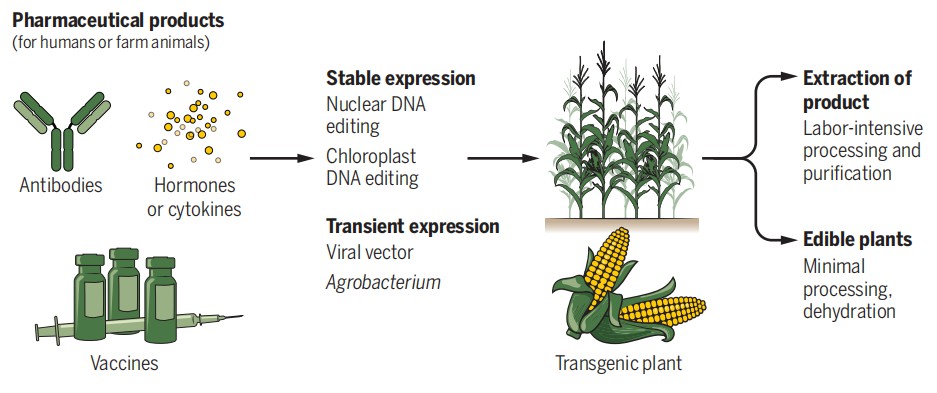Therapeutic proteins such as vaccines, antibodies, hormones, and cytokines are typically produced in bacterial or eukaryotic systems, including egg, mammalian, or insect cell cultures. In research conducted over the past decade, using plants to produce and deliver vaccine proteins has shown promise. Edible plants such as cereal crops, tomatoes, corn, and rice are being developed for oral delivery of plant-based therapeutic proteins. Genes encoding bacterial and viral antigens are faithfully expressed, processed, and assembled in plant cells to form immunogenic proteins. The use of plant bioreactors to express disease antigen proteins for therapeutic production has the unique advantages of being safe, cheap, and easy to promote. It has become one of the research hotspots in the field of biotechnology. Plants express different lectins, glycans, saponins, heat shock proteins, etc., making plant-derived proteins more immunogenic than their mammalian counterparts. The clinical utility of many therapeutic proteins is undermined by the possibility of generating unwanted immune responses against the protein, thereby limiting their efficacy, and negatively affecting their safety.
 Fig. 1. Using transient expression systems, plant-made vaccines, and therapeutic proteins can be produced within weeks. (Fausther-Bovendo et al., 2021)
Fig. 1. Using transient expression systems, plant-made vaccines, and therapeutic proteins can be produced within weeks. (Fausther-Bovendo et al., 2021)
Immunogenicity assessment is an important component of all therapeutic protein development. Lifeasible leverages its years of plant biotechnology expertise to delve into plant-made therapeutic proteins' immunogenicity issues and provide comprehensive analytical solutions.
Our immunogenicity analysis services for plant-made therapeutic proteins include, but are not limited to:
A deep understanding of plant protein structure and function is key to predicting potential immunogenicity. We have a variety of analytical techniques to evaluate protein characteristics that may be relevant to immunogenicity, including thermal methods (differential scanning calorimetry, microcalorimetry, thermogravimetric analysis), spectroscopic techniques (Fourier Transform Infrared (FTIR), Near Infrared (NIR), Raman), crystallography (X-ray diffraction), and Nuclear Magnetic Resonance (NMR). Our advanced technology platform is capable of:
Prior to any in vitro or in vivo analysis, our computational biology team uses algorithms and databases to map protein conformations, identify and predict immunogenicity sites, and circumvent immunogenicity. This provides an initial screen and helps design subsequent experimental analyses.
Lifeasible offers a range of in vitro assays to assess the potential immunogenicity of plant-made therapeutic proteins, including T cell proliferation assays, intracellular cytokine staining, dendritic cell maturation studies, etc. We ensure that each protein undergoes rigorous in vitro testing.
Plant-made therapeutic proteins offer endless possibilities in the biopharmaceutical field. Lifeasible ensures their safety through rigorous immunogenicity analysis. Please contact us for the best immunogenicity analysis solutions for plant proteins.
Reference